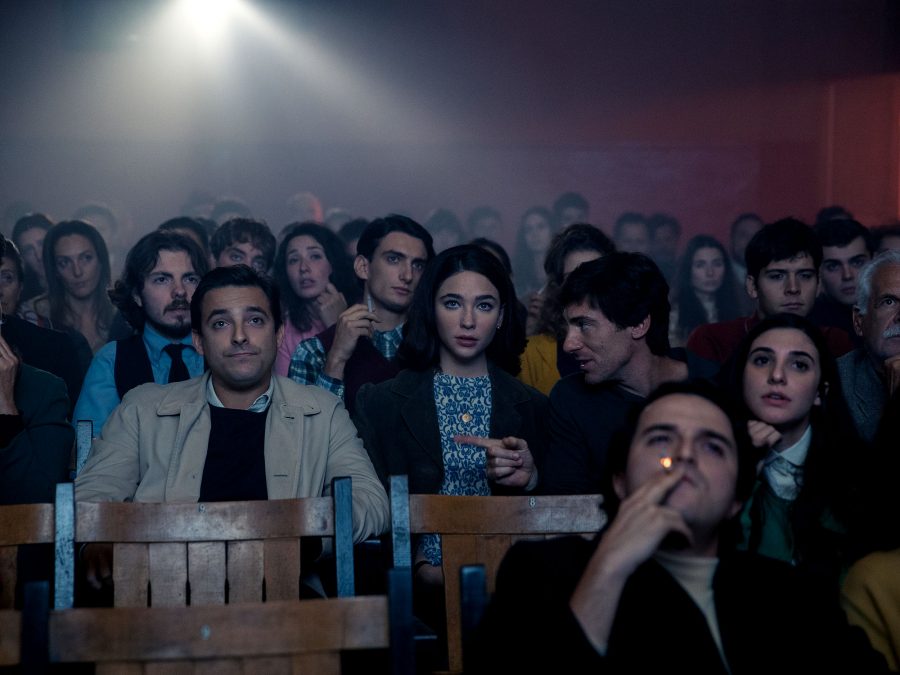Relatively early in 2020, one video game became a phenomenon as Nintendo Switch players looked to simulate some sort of structured existence in the context of quarantine. Animal Crossing: New Horizons sees your customisable character move to a deserted island, decorating the place and developing it into a community of anthropomorphic animal residents. Selling the most units of any title in 2020, it has already cracked the top 30 list of the best-selling video games of all time.
All the specific factors for Animal Crossing’s success would merit a deep-dive article, but one thing appears clear: with the world in the grip of a pandemic, vaguely whimsical explorations of forming start-up communities during a period of global unrest are hot right now. By sheer luck of timing, Sydney Sibilia’s Rose Island, based on the real-life story of an island being created and bringing people together, looks set to capitalise on this.
In 1967, eccentric Italian engineer Giorgio Rosa (played here by Elio Germano) designed and financed the construction of a 400-square-metre man-made platform, supported by several steel pylons suspended 26 metres above the seabed, located in the Adriatic Sea just short of seven miles off the coast of the Italian province of Rimini. As the platform was built ever so slightly beyond Italian territorial waters, it was outside the control of the authorities.

Rosa sought to build a micronation as a symbol of freedom, and, with the help of collaborators, furnished the platform with commercial establishments like a restaurant, bar and nightclub. Amid a backdrop of worldwide protests and wars raging on, Rosa’s operation became a hotspot for young people seeking pleasure and freedom. In June 1968, the platform declared independence under the Esperanto name ‘Insulo de la Rozoj’, further fuelling rage from the Italian government who viewed the island as a ploy to get money from tourists while avoiding national taxation, also considering it a potential threat to national security.
This lightly fictionalised film opens in November 1968 in Strasbourg, with Rosa having travelled in a vehicle he designed himself to make a case for the island’s existence as a ‘head of state’. Jumping back and forth in time until events catch up to this framing device, Rose Island is a breezily entertaining watch throughout. Production values, perhaps due to Netflix’s backing, are particularly strong, with the recreation of the island – shot in an infinity pool in Malta in much shallower water – a genuinely impressive feat of design and engineering.
Formally though, what stands out most about Rose Island is how it appears to have been inspired by, of all films, The Walk, Robert Zemeckis’ big-budget 3D retelling of Philipe Petit’s high-wire walk between the Twin Towers of the World Trade Center. Both film share a similar tone and sense of humour, as well as a heist movie-style framing for their grand finales and assembling of key crew. The cinematography and staging of the construction of the island, too, seem tailored for a 3D release the film will never have.
ANTICIPATION.
Who among us would not like to create our own island in international waters? 4
ENJOYMENT.
The sort of mainstream crowd-pleaser that would thrive in independent cinemas in more ordinary times. 3
IN RETROSPECT.
Entertaining adaptation of an anarchistic story that deserves to be better known. 3
Directed by
Sydney Sibilia
Starring
Elio Germano, Fabrizio Bentivoglio, Tom Wlaschiha
The post Rose Island appeared first on Little White Lies.
![Forest Essentials [CPV] WW](https://s3-us-west-2.amazonaws.com/pcw-uploads/logos/forest-essentials-promo-codes-coupons.png)
0 comments